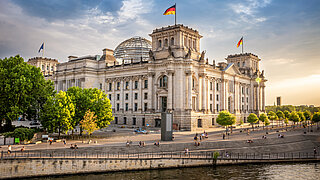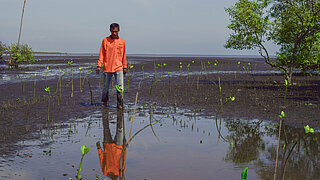The IKI – a retrospective
Constant development towards effective climate action and biodiversity conservation (as of: June 2023)
Since its formation in 2008, the International Climate Initiative (IKI) has undergone continuous adaptation to current developments – both structurally and thematically. The most important points of orientation here were and are the UN Climate Change Conferences (Conferences of the Parties (COP) to the UNFCCC) and the Conferences of the Parties (COP) to the Convention on Biological Diversity (CBD).
The overall aim of the IKI is to meet the growing challenges caused by climate change and the loss of biodiversity with innovative approaches in project work that go beyond the individual project itself. Ideally, this means that successful approaches should be disseminated and scaled up as far as is possible. In this way, the programme helps to create the frameworks needed for effective climate and biodiversity policy.
From the outset, the IKI has based its work on close and mutually beneficial cooperation with the developing and emerging countries in which the projects are implemented. Long before this year, its 15th anniversary, the IKI has been recognised as an important player in the international funding landscape, and therefore a reliable partner for climate change mitigation and biodiversity conservation.
Beginnings
2008: On the initiative of the German Federal Environment Ministry, the International Climate Initiative is formed by a decision of the German Bundestag. The Ministry explains that it wishes to “make an effective contribution to the mitigation of greenhouse gases and adaptation to climate change,” and to “supplement existing development cooperation with this new form of environmental cooperation.” The focal points for the IKI are described as being “in the areas of funding sustainable energy supplies, funding measures for the adaptation to the impacts of climate change and to biodiversity conservation with relevance for the climate.”
During the first few years, the budget for the funding programme was provided by the proceeds of emissions trading auctions. In 2008, EUR 120 million was made available to the IKI. Fifteen years later, the IKI is now a fixed item in the Federal Budget.

Source:
A new funding area: conservation of biological diversity

Further information:
2010/2011: In October 2010, the 10th Conference of the Parties to the Convention on Biological Diversity (CBD COP10) was held in Nagoya, Japan. One major outcome of this event is a strategic plan that the signatory states have adopted for biodiversity until 2020. Together with the Aichi targets, this plan sets out concrete global targets for biodiversity conservation.
The conservation of biological diversity has been one goal of project funding since the formation of the IKI. Responding to the setting of the Aichi targets, the IKI in 2011 established an independent biological conservation funding area. In this way, the IKI recognises both the growing importance of the topic, and the connection between the decline in biodiversity and the impacts and consequences of climate change. The additional funding required is taken from the special federal Energy and Climate Fund, which the German Federal Government uses to fund additional programme expenditure to promote the supply of environmentally friendly, reliable and affordable energy, and climate change mitigation.
Multilateral climate finance: support for the Green Climate Fund
2010: At the 16th Conference of the Parties in Cancún (Mexico) (COP16), the global community decides to set up a Green Climate Fund (GCF). With the GCF as an instrument for multilateral climate finance, the idea is to promote the global transition towards low-carbon and sustainable development. The GCF also works with stakeholders in the private sector, with the aim of mobilising additional funding for mitigation and adaptation measures.
2013 marks the beginning of the IKI’s support for the GCF, initially providing EUR 15 million to the GCF Readiness Programme. The programme helps government agencies to learn how to submit successful proposals to the GCF, so that the finance provided by the fund can actually be accessed and used to implement climate change mitigation measures.
In the same year, the German Federal Environment Ministry and the UK Department for Business, Energy and Industrial Strategy (BEIS) jointly announce the formation of the NAMA Facility at the UN Climate Change Conference in Doha (COP18), for which they provide EUR 69 million in 2013. Denmark and the European Commission join NAMA as additional sponsors in 2015. Now renamed the Mitigation Action Facility, the German Government continues to support the initiative via the IKI, which remains its biggest sponsor.

NDCs: IKI supports preparation of the Paris Agreement

2013: Most of the work at COP19 in Warsaw is focused on preparing a new climate change agreement. To this end, all signatory states are asked to formulate their Intended Nationally Determined Contributions (INDCs). The IKI responds to this need. In 2014, the IKI project Support to selected partner countries in developing their Intended Nationally Determined Contributions (INDCs) is initiated.
In 2015, Nationally Determined Contributions (NDCs) are established as a central instrument of the Paris Agreement (COP21). These nationally determined contributions (NDCs) are binding on each of the signatory states, and require concrete steps to be drawn up for their implementation, followed by the development of a mechanism to raise NDC ambitions. Countries must submit regular reports on progress made towards these goals.
In the run-up to the Paris Agreement, the support project carried out by the IKI was an important contribution towards creating the requirements for the ratification of the agreement.
In 2016, the German Government worked together with other developed, transitioning and developing countries as well as multilateral organisations to establish the NDC Partnership during COP22 in Morocco. This global initiative aims to support implementation and ambition raising for NDCs. The IKI responds by setting up the NDC Support Cluster, which brings together individual IKI projects with an NDC focus and the NDC Partnership, so as to facilitate dialogue and synergy effects.
Adaptation to the climate crisis impacts
2015: With the United Nations Framework Convention on Climate Change, developed countries agree to provide developing countries with high levels of vulnerability and low levels of adaptability with financial, technical and institutional support for measures necessary to adapt to the climate crisis. In the 2015 Paris Agreement, the signatory states agree a binding target for adaptation to the climate crisis.
Since the formation of the IKI, the German Government has funded projects in partner countries that aim to increase the adaptability of countries and regions with a high level of vulnerability to the impacts of the climate crisis. Closely tracking the UNFCCC process and the Convention on Biological Diversity, the thematic funding priorities in the IKI’s adaptation scope are continuously developed and the most urgent needs supported, as identified in national processes such as national adaptation plans or action programmes.

Further information:
How effective are IKI projects?

Further information:
How many trees have been planted? How many solar modules have been installed? How many training courses have been completed? What total area of intact ecosystems has been protected? From the outset, IKI projects have used individual key figures, tailored to the various approaches used, to audit the effectiveness of their measures.
To better understand the overall performance of the funding programme, with all of the various projects in the four funding areas, the IKI in 2015 established a set of standard indicators that add an extra level of per-project success monitoring. This makes it possible to document how the IKI contributes to overarching goals such as the reduction of greenhouse gas emissions or the strengthening of political climate and biodiversity frameworks.
So what happens to all of the money that the German Federal Government provides for climate and biodiversity financing? Since 2016, the IKI has published quarterly reports that provide comprehensive details of ongoing and newly approved projects and programmes. This is important, since transparency makes planning easier for recipient countries, limits the risk of corruption, increases personal responsibility on the part of partners and promotes mutual accountability. The IKI models its performance reporting on the latest standards published by the International Aid Transparency Initiative, which was co-founded by the Federal Government (IATI data).
Transparency is very important for the IKI, because information about project work facilitates mutual learning. This is also the reason why IKI projects are published with a description and progress report on the IKI website.
Updates to IKI funding structure
In a two-stage process, the IKI raises its profile with a new funding structure. As a first step, thematic calls and country calls with IKI prioriy countries are introduced, which facilitate large-volume consortium projects with a per-project budget of up to EUR 20 million. Two small project funds (IKI Small and Medium Grants) are later established to facilitate the implementation of measures to mitigate greenhouse gases, for adaptation to climate change, in relation to natural carbon sinks and to support biodiversity conservation also at local level with smaller-scale actors.
- 2017: The first IKI Thematic Call is published, with ten funding priorities. A total of 267 project outlines are submitted to the IKI, from which a shortlist of ten projects is selected. Funding priority is given to regional projects that have focal points in the four funding areas.
- 2018: The first bilateral IKI Country Calls are published, with initial partner countries Colombia, Mexico and the Philippines. The aim here is to strengthen bilateral cooperation with IKI priority countries while targeting priorities developed as a joint activity.
- 2019/2020: Funding windows are opened for the first time for the IKI Small Grants programme for smaller-scale local and regional actors, and the IKI Medium Grants programme, which aims at improved North-South cooperation between implementation organisations.

Further information:
Coronavirus pandemic: rapid aid for sustainable recovery

Further information
Topic page: IKI Corona Response Package
2020: The Covid-19 pandemic poses a serious challenge to all countries and governments worldwide. The top priority here is protecting the health of all citizens. At the same time, joined-up approaches are needed to avoid future pandemics while restarting economic activities – and without discarding the relatively recent policy-making approaches and activities to protect the climate and biodiversity.
The IKI responds by developing a Corona Response Package. The package is already available only a few months after the start of the pandemic and helps partner countries to tackle these challenges. To this end, selected ongoing projects and initiatives receive supplementary agendas and funding.
Three ministries join forces within the IKI
2021: Climate change mitigation is a key topic for the newly formed German Government.
For the IKI itself, this means that three ministries now contribute their resources to the implementation and further development of the funding programme – the Ministry for Economic Affairs, the Ministry for the Environment and the Federal Foreign Office. The role of coordinating IKI work is assigned to the new Federal Ministry for Economic Affairs and Climate Action (BMWK).
2021/2022 the IKI gets a new look: the new design and the new logo reflect the fact that the IKI is constantly moving forward. Shortly afterwards, our new website goes live - in a new design and, above all, with an improved and user-friendly structure.

The Kunming-Montreal Global Biodiversity Framework

In December 2022, the Kunming-Montreal Global Biodiversity Framework (GBF) succeeds the Aichi targets from 2010, becoming the new guidance document for the IKI’s engagement with the conservation and sustainable use of biodiversity.
At CBD COP 15 in Montreal, the IKI launches important initiatives designed to contribute decisively to GBF implementation, including
- the NBSAP Accelerator Partnership,
- the Global ICCA Support Initiative 30x30 aimed at strengthening indigenous peoples and local communities, and
- a programme for supporting the work of the Taskforce on Nature-related Financial Disclosures (TNFD).
Values and responsibility in project work
Part of the IKI’s own self image involves participative approaches to project work, and the declared goal of avoiding negative impacts on human communities and the environment. The IKI has developed (and fine-tuned) various instruments to support this goal.

2021: Publication of the IKI Gender Strategy. IKI projects are designed so as to ensure the prevention of disadvantages and the avoidance of discrimination based on gender. The potential offered by all stakeholders must be utilised to help improve climate action and help to conserve biodiversity.
Further information:
In 2022, the IKI introduced an Independent Complaints Mechanism (ICM). The IKI ICM ensures that people who have been negatively impacted by project activities can express their opinion, and can report infringements of environmental and social standards. This provides an external control for IKI project activities.
Further information:


In 2023, the IKI Safeguards Policy and IKI Exclusion Criteria enter into force. Project work often takes place in circumstances that are characterised by weak democratic governmental structures, structural inequality and fragile ecosystems. To ensure that projects can act prudently, and provide the best protection to the environment and people, the IKI commits to complying with international environmental and social standards as part of its duty of care.
Further information:
2023: The IKI has refined its local content standards and now also reviews these at the project selection stage. Background: IKI funding for projects in transitioning and developing countries should be spent specifically to further project goals. Long-term project success here depends decisively on the participation of local actors in IKI projects. This step improves the embedding of the projects within the institutional, political, cultural, socio-economical and ecological context of partner countries.
Further information:

2023: The IKI 15th anniversary year – “Committed to the planet and the people”
The link has been copied to the clipboard




